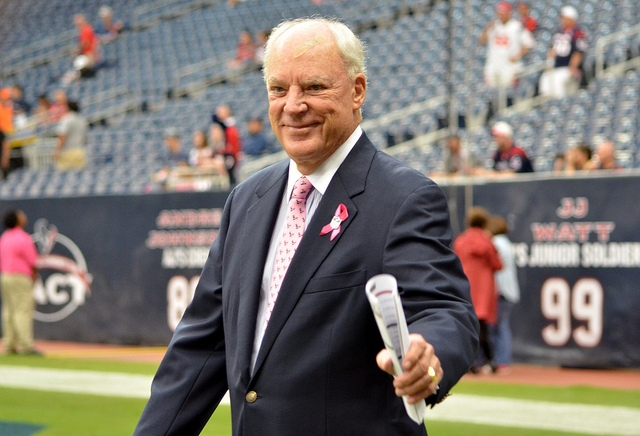On November 3rd, voters will go to the polls to determine the fate of Houston’s Equal Rights Ordinance. If it passes, pregnant women, veterans, the elderly, and a dozen other groups of people will find they can’t be fired, evicted, or turned away from a business because of who they are.
Here’s what we can expect if HERO doesn’t pass:
1. Another Embarrassing Moment for Texas on the National Stage
The State of Indiana recently faced a similar firestorm over equal rights protections, and if Indiana’s past is Houston’s prologue, we’re headed for catastrophe. We have enough trouble as it is convincing the rest of the world that Houston is the most diverse city in the United States, a vibrant and eclectic mosaic of art and culture and sports and food. If we decide to legalize discrimination, none of that will matter; the only story anyone will hear is that we were offered the chance to secure equal rights for all our citizens, and we turned it down.
2. We Risk Losing the Final Four and the Super Bowl
In 2015, Phoenix hosted Super Bowl XLIX. That almost didn’t happen. A year earlier, the state of Arizona sent a bill legalizing discrimination to then-governor Jan Brewer for her signature. While the law sat on her desk, the NFL issued a statement indicating its displeasure with discrimination and its intent to “follow the issue.”
Exactly one day later, Brewer vetoed the law, and a year after that, Arizona raked in three-quarter of a billion Super Bowl dollars.
Earlier this year, when Indiana actually passed a law legalizing discrimination, The NCAA responded by condemning the bill, reaffirming its commitment to diversity, and even suggested it might consider moving its headquarters out of the state.
But in Indiana, it didn’t stop there. The Colts’ owner lambasted the law. The entire professional basketball community attacked it. Major League Baseball criticized the law, evoking the spirit of Jackie Robinson. Even NASCAR expressed its disappointment.
3. You Can Expect to Pay a Cover Charge (Unless You’re White)
If you’re a black man or a Latina woman, you might be stuck with a $20 cover charge at a bar, while the white folks in front of and behind you get in for free. (And should complain about that and choose to leave, a bouncer might tell you to “have a good night in the ‘hood’” or “Tell Tyrone I said ‘hi’”.)
Unfortunately, racial discrimination in Houston is very real. In fact, while HERO was in effect, more than half of the discrimination complaints were filed on the basis of race.
And yes, there are federal protections outlawing racial discrimination, but the only way to benefit from them is to sue in federal court, which is exactly what three African American attorneys are doing. Most of us don’t have the resources to hire an attorney for the years it takes to win that kind of case, but if HERO doesn’t pass, that’s your only option.
4. We’ll Have a Lot Fewer Visitors
After it passed its religious refusal bill, three states and five major cities banned official travel to Indiana. Musicians and artists canceled concerts and exhibits. Celebrities from around the country condemned the law. Nick Offerman explained why he canceled a show by channeling Leslie Knope of Parks & Recreation: “Leslie would have said that while religious freedom is a basic and fundamental right, it is not more basic or more fundamental than the words all men are created equal.”
5. No Really, a Lot Fewer Visitors, and It's Going to Cost Us
Houston ranks nineteenth in CVent’s top 50 business meeting destinations in the U.S. (It’s also the only city in the top 20 without an equal rights law.) Every year the city of Houston welcomes hundreds of thousands of visitors to conventions, events, and shows, which every year rake in about half a billion dollars.
Again, taking Indiana as an example, their attempt to legalize discrimination scared away enough visitors and conventions that it would have cost Indianapolis
a million room nights — or $1.5 billion dollars — had legislators not come to their senses and amended the law. That’s what a “no” vote will cost us.
6. Houston’s Economy Will Take a Beating
The business of Houston is business, and if we fail to pass HERO, business doesn’t look good. There’s a reason hundreds of businesses and business leaders have announced their full-throated support for Houston’s Equal Rights Ordinance. There’s a reason that the Greater Houston Partnership and the Greater Houston Convention and Visitor’s Bureau are fighting to keep HERO on the books. There’s a reason that Houston’s developers and realtors have mobilized.
That reason? Discrimination is bad for business.
We know all this because while the media storm makes it feel like HERO is something new and revolutionary, it really isn’t. Dozens of states and hundreds of cities already have laws identical to HERO, many of which have been in place for decades. In fact, Houston would be the last major city in Texas to pass such a law. So we already know what will happen if HERO passes, and we should shudder to think of what will happen if it doesn’t.
Donate to the Houston Unites campaign today and keep HERO in Houston.





